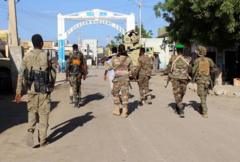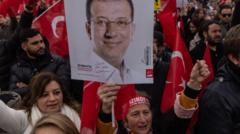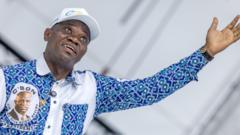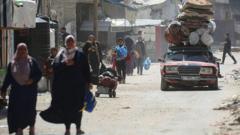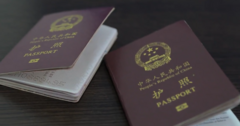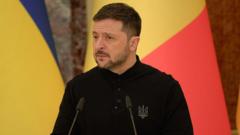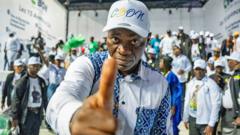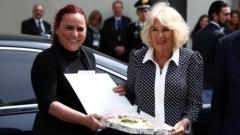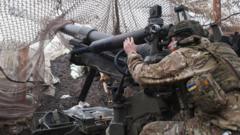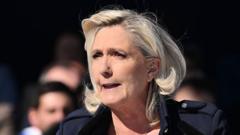Ocalan's appeal comes as part of a broader initiative to end decades of violence in Turkey's southeast, offering a new path forward amid a complex political landscape.
**Kurdish Leader Urges Peace: A Historic Call to Disarm and Rebuild**
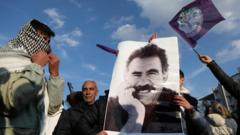
**Kurdish Leader Urges Peace: A Historic Call to Disarm and Rebuild**
In a groundbreaking statement, imprisoned PKK leader Abdullah Ocalan appeals for peace, urging his followers to cease armed conflict and embrace democratic dialogue.
Abdullah Ocalan, the long-imprisoned leader of the PKK (Kurdistan Workers' Party), has issued a profound call for peace, urging his followers to disarm and dissolve the organization. His statement, delivered through pro-Kurdish MPs, is seen as a pivotal moment intended to halt over forty years of armed conflict in southeastern Turkey, which has claimed tens of thousands of lives.
During a recent meeting with MPs on Imrali Island, where he has been confined since 1999, Ocalan expressed his hope that armed struggle could come to an end. His plea builds on a political climate shaped by recent gestures from ultra-nationalist leader Devlet Bahceli, who has hinted at possible parole for Ocalan contingent upon a commitment to cease violence.
"There is no alternative to democracy in the pursuit and realisation of a political system," Ocalan wrote in his letter, highlighting democratic consensus as essential in moving forward. His message was broadcast in both Kurdish and Turkish at gatherings in cities such as Diyarbakir, where community leaders and locals welcomed the news along with cautious optimism.
Bahceli's recent interactions with pro-Kurdish politicians signal a possible shift in the government’s stance toward the PKK, a group designated as terrorist by Turkey and several nations. Noting a newfound opportunity for dialogue, Ocalan encouraged the PKK to lay down arms, asserting that the environment created by Bahceli and President Erdogan might have opened doors previously closed to negotiation.
However, skepticism remains within both Kurdish and Turkish societies regarding the real intentions behind these developments. Some PKK leaders, like Duran Kalkan, have expressed doubts, suggesting that the ruling AKP aims to dominate rather than genuinely resolve the conflict. Additionally, reports of ongoing military actions against Kurdish groups in both Turkey and Syria complicate the atmosphere of hope.
Recent years have seen a crackdown on pro-Kurdish politicians; high-profile figures have been imprisoned, raising alarms about the broader implications for democratic processes within Turkey. As this complex narrative unfolds, local factions within Kurdistan are closely observing the ramifications of Ocalan's call, with the future of peace in this historically tumultuous region hanging in the balance.
During a recent meeting with MPs on Imrali Island, where he has been confined since 1999, Ocalan expressed his hope that armed struggle could come to an end. His plea builds on a political climate shaped by recent gestures from ultra-nationalist leader Devlet Bahceli, who has hinted at possible parole for Ocalan contingent upon a commitment to cease violence.
"There is no alternative to democracy in the pursuit and realisation of a political system," Ocalan wrote in his letter, highlighting democratic consensus as essential in moving forward. His message was broadcast in both Kurdish and Turkish at gatherings in cities such as Diyarbakir, where community leaders and locals welcomed the news along with cautious optimism.
Bahceli's recent interactions with pro-Kurdish politicians signal a possible shift in the government’s stance toward the PKK, a group designated as terrorist by Turkey and several nations. Noting a newfound opportunity for dialogue, Ocalan encouraged the PKK to lay down arms, asserting that the environment created by Bahceli and President Erdogan might have opened doors previously closed to negotiation.
However, skepticism remains within both Kurdish and Turkish societies regarding the real intentions behind these developments. Some PKK leaders, like Duran Kalkan, have expressed doubts, suggesting that the ruling AKP aims to dominate rather than genuinely resolve the conflict. Additionally, reports of ongoing military actions against Kurdish groups in both Turkey and Syria complicate the atmosphere of hope.
Recent years have seen a crackdown on pro-Kurdish politicians; high-profile figures have been imprisoned, raising alarms about the broader implications for democratic processes within Turkey. As this complex narrative unfolds, local factions within Kurdistan are closely observing the ramifications of Ocalan's call, with the future of peace in this historically tumultuous region hanging in the balance.




